NHERI STORIES: DIVERSE PATHS TO ENGINEERING
Early-career researcher Alia Amer is all about resilience – in large-scale structures, and in the engineering profession
Published on November 27, 2023
Alia Amer, PhD
Postdoctoral Researcher
NHERI Lehigh Real-time Cyber-Physical Structural Systems Testing Laboratory
Lehigh University
My name is Alia Amer. I'm originally from Cairo, Egypt. I did my bachelor's there in structural engineering. I worked in industry – and also taught – in Cairo for three years. In 2016 I came to Lehigh University, where I did my masters and PhD. I worked on the NSF-funded Tallwood project here at Lehigh, which focused on developing seismically resilient tall wood buildings,. I earned my PhD last May and then got a postdoc position at the NHERI facility at Lehigh.
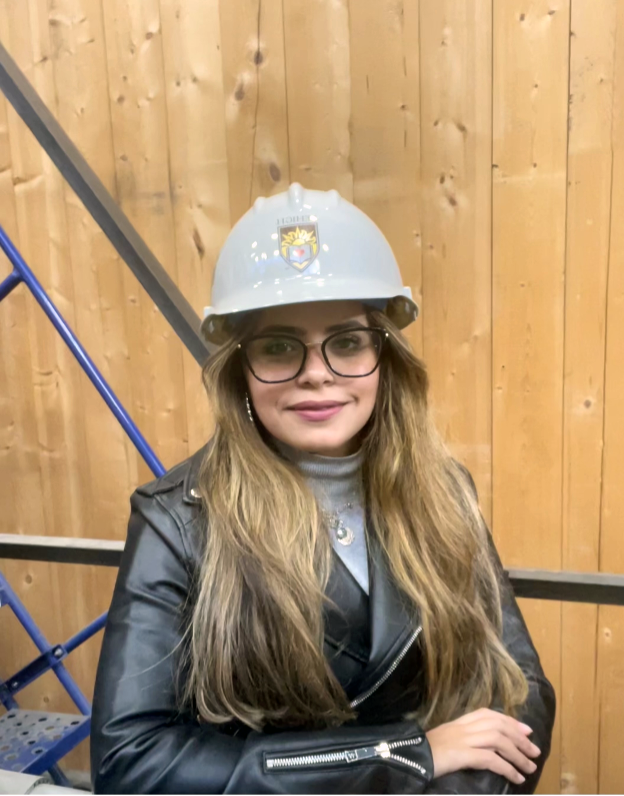
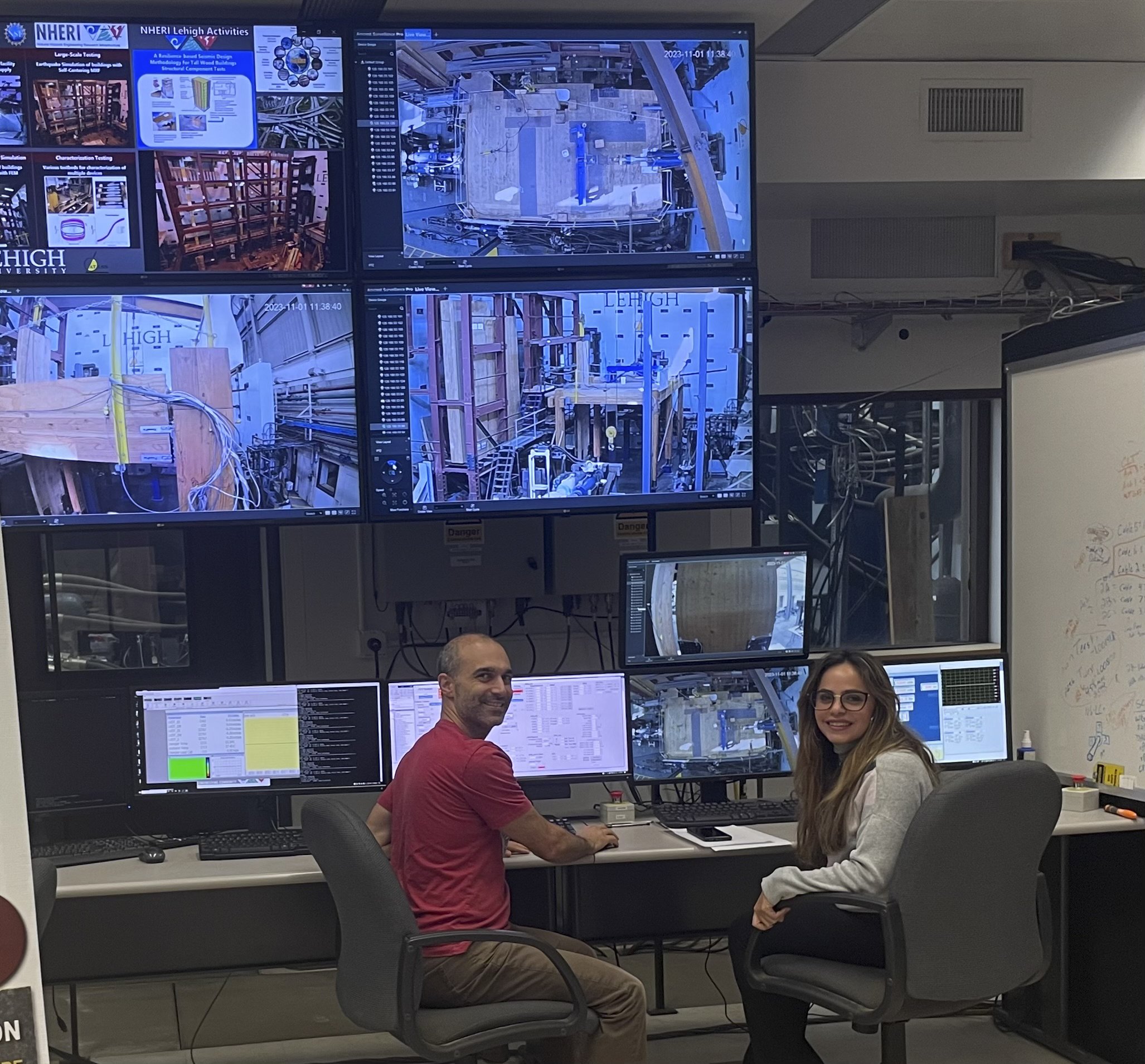
In the control room with Tommy Marullo, Research Scientist at NHERI Lehigh
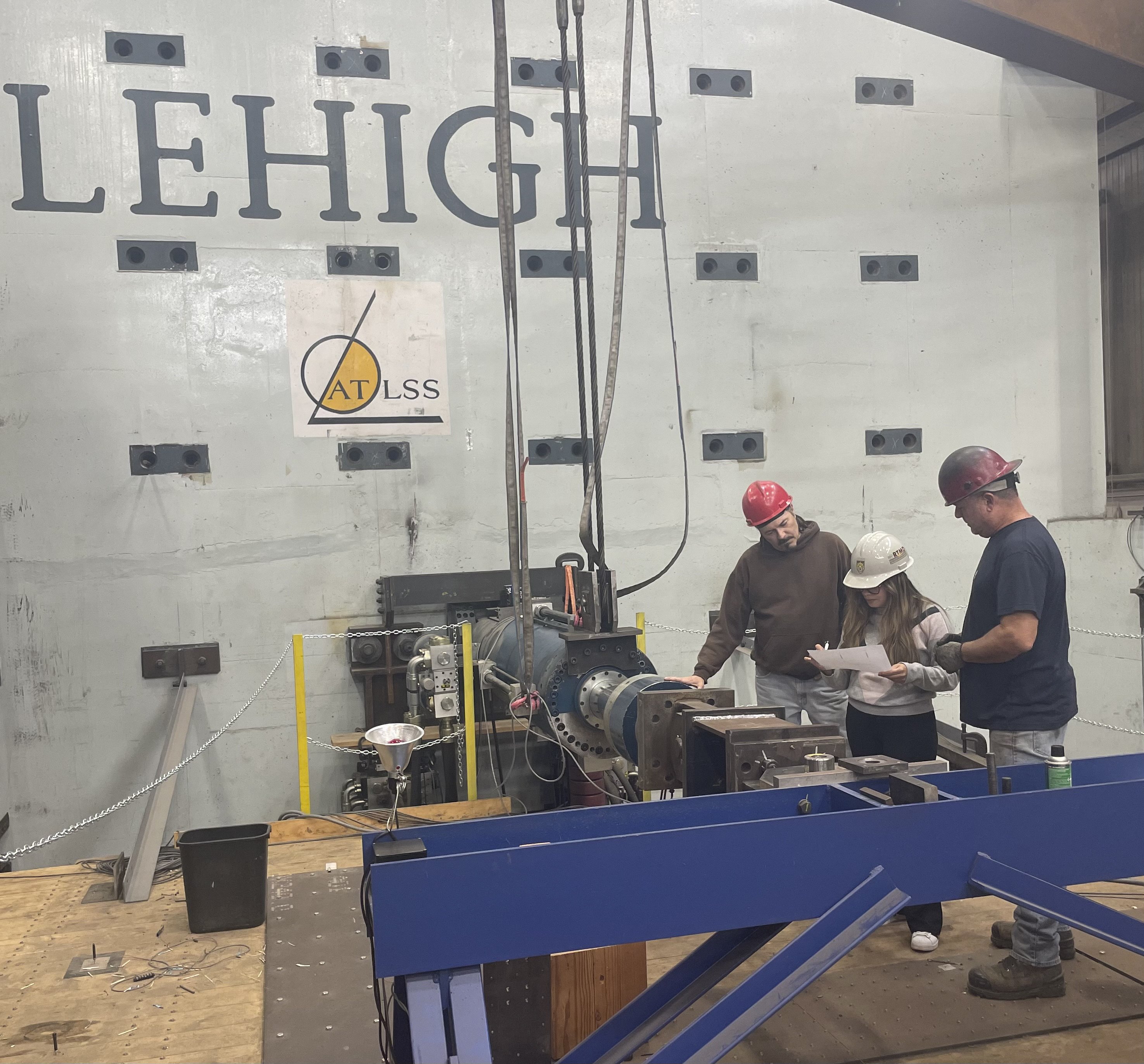
With ATLSS technical staff Todd Anthony and Jeff Sukanick
What do you consider your specialties as a researcher?
Definitely, seismic resilience of structures is my main focus. I am so proud that I was involved in a large-scale testing project! It's very rare that a female gets involved in a big project like this and is responsible for a such a big project. I was the boss and the student and everything. Here at Lehigh, we were focusing on the behavior of the structural components under multidirectional loading. We built part of a timber building and tested it here, multiple times, to investigate different aspects of the project.
So, I consider myself also an experimentalist. I have expertise in conducting large-scale testing— from the sensors, the control, how to control actuators, how to run the whole specimen, how to design the fixtures, and so on. These are my hidden talents.
How you first became interested in engineering?
This is a funny story, because I come from a family of medical doctors. No one is an engineer in my family. I am the first one. They were so surprised that I would not be extending their legacy. But I have a kind of rebellious character. I wanted to have my own identity. I was so interested in math and physics. I was always interested in watching documentaries about how things are built, how cars work, and all this kind of stuff. I said, ‘Okay, I'm good at math. I'm just going to pick engineering.’ So I applied to the engineering school. In Egypt, in the first year of engineering you get exposed to general topics. I was very good at mechanics and physics. It was very fun. Calculations related to structures —stresses and that kind of thing — were fun for me. It wasn't hard. And I enjoyed it. So I picked civil engineering. It was a good choice.
Why do you leave industry and for academia?
Well, I didn’t actually leave academia. I graduated at the top of my class in Cairo. And when you're in the top, they give you a teaching position. They want to keep you. I was appointed a lecturer position where I was teaching design courses.
But in parallel, I also worked in industry as a design engineer. That was fun at the beginning, but it became repetitive, basically due to the nature of the projects. After a while, there were no challenges, and I like challenges!
So being a design engineer, sitting in the office designing columns and beams, just didn’t suit my personality. I want to always have new, different problems to solve. And I like teaching, I really like to be involved with the students.
What's your teaching approach?
I always want my students to have a better experience than mine; that's always my vision. Whenever I enter a class, I want them to enjoy it as much as they can. I also want them to feel that they are my colleagues, like we're learning from each other.
For example in engineering design classes, I was teaching new systems, but the students also had to be creative. Which enabled me to learn from them, too. Also, when students feel like they're important, that what they’re designing is appreciated by their professor — they gain confidence — so they are less afraid of making mistakes. I’m really comfortable with this friendly approach. Also, I was a young instructor, and I think it helped a lot that I was closer in age to my students.
Also, I was very keen to always get feedback after a couple of lectures, not just at the end of the semester. So, after a couple of lectures, I would ask them, ‘Do you guys do have any ideas? Do you like this? What don't you like?’ So I was always changing my teaching approach. Even during the semester, I didn’t feel I had to stick to something that wasn’t working.
Here at Lehigh, one of my professors had a medical emergency, and I was assigned to teach one of his classes. So, I have taught in the U.S. as well as in Egypt.
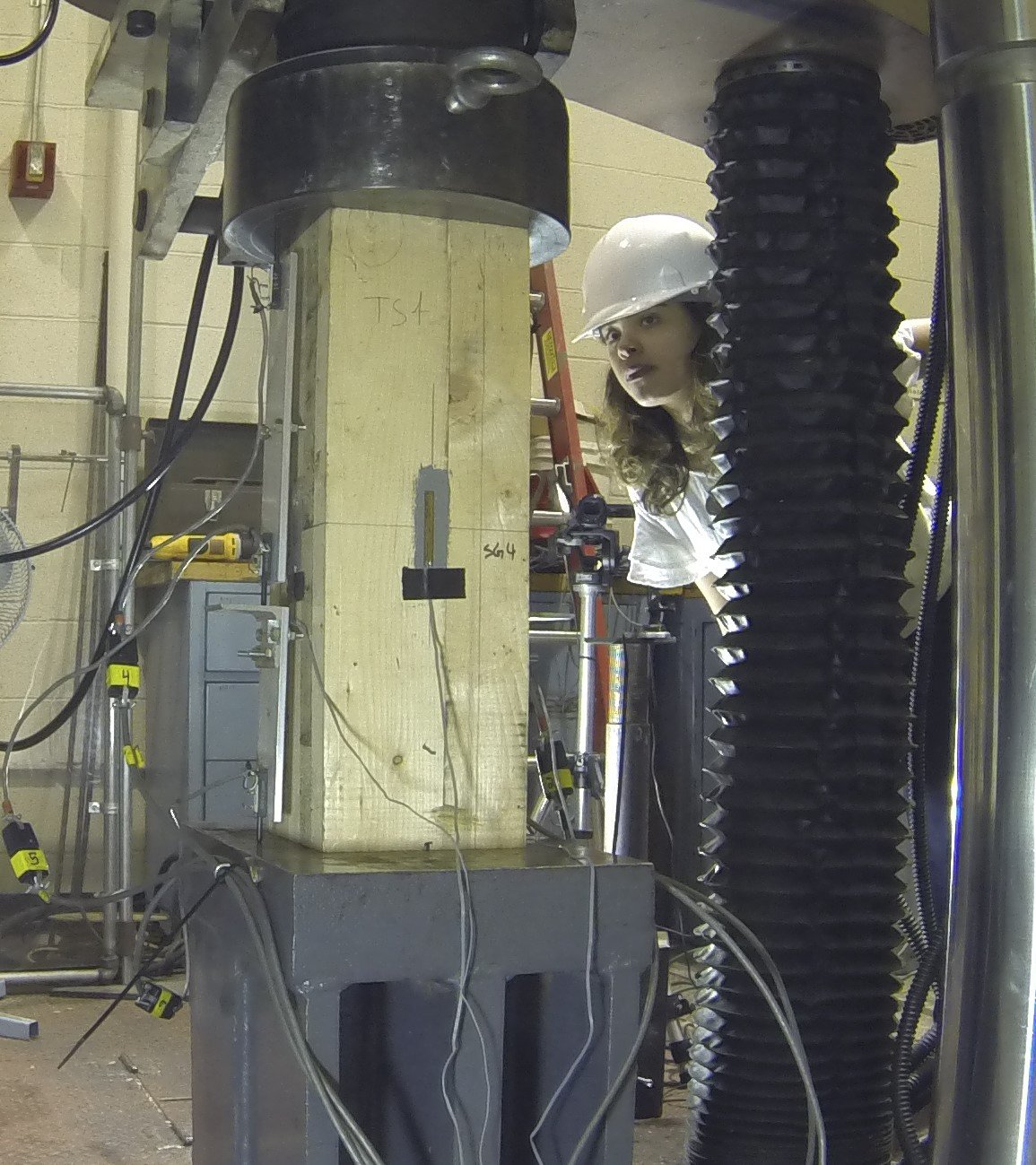
Small-scale testing
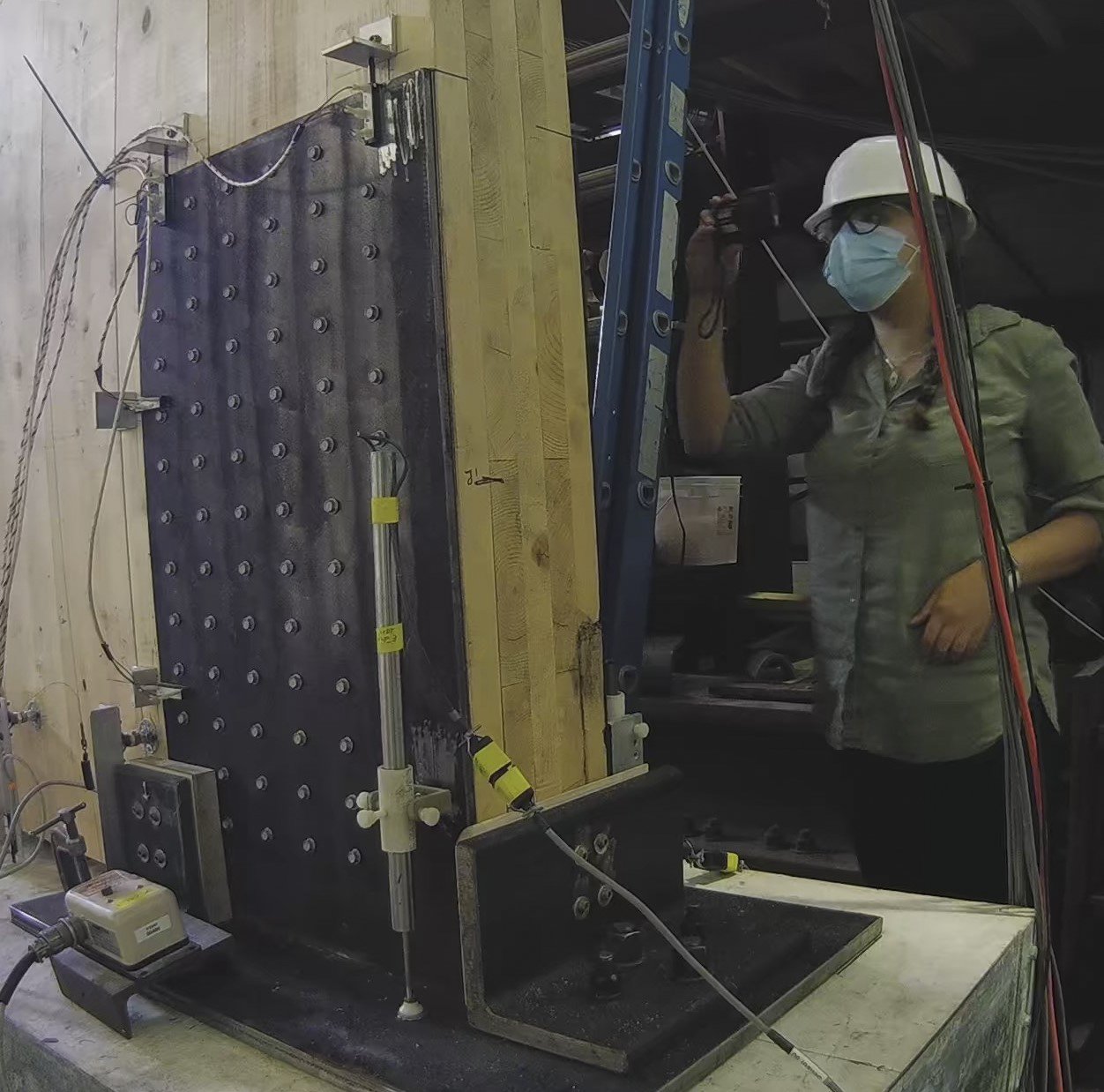
Testing during the pandemic
You’ve had success on the engineering career path. Can you discuss obstacles you’ve faced?
Yes. Just being a woman is an obstacle. Structural engineering is very male-dominated — back home in Egypt and here in the U.S. Also, working mainly in the lab can be kind of lonely. Last year, I was the only female in the lab. In that situation, you don't have your own personal environment to click with.
Still, my experience in the U.S. has been good — because I have had really good advisors here at Lehigh, Professor Richard Sause and Professor James Ricles. They believed in me. They believed in me so much that they assigned me to this big experimental project, the Tallwood project. They were confident that I would do a good job.
But at the same time, I think women sometimes have to work two times or three times harder. You don’t want people to take you for granted. You work hard so you can say, ‘Hey, I’m good enough.’ That's one aspect.
But then sometimes, even though right now there have been major changes in the profession with women being being involved in different aspects of it, at the same time sometimes you find you're being celebrated just because you're a woman, not necessarily because you did a great job.
So that's also something I think people need to be educated about. I've heard it multiple times. ‘Hey, let's include Alia, because it's good to show that we have women working in the lab.’ No, it should be, ‘Let's include Alia because she worked on an amazing project and she did good job.’ You don't want to hear that you’re included just because you’re a woman. These kinds of comments belittle you. So it requires a lot of work on your end, as a female engineer, to break down these sorts of obstacles, so they don't stop you from doing what you love.
What advice do you have for young women getting started in engineering?
I always tell my female friends and colleagues: ‘Be like a sponge. Absorb the negative comments and just squeeze them out! Get rid of them! And come back, be resilient.’ Because you're going to face it, no matter what. The other thing is that these kind of obstacles make you tougher, actually. It’s like training for your mental toughness. It’s not a bad thing, actually. So you can even become stronger than your colleagues!
The second thing I like to emphasize is selecting a good environment. Find a supportive environment, with good mentors. In academia, there are a lot of people who like to help. So if you feel you're in an environment where you are not treated well, or you're not being heard — just leave. It’s okay to leave. It’s not a failure to quit something that’s bad for you.
Because I'm female. So, I understand that sometimes you have to make that decision and leave that environment that is toxic for you, that’s not helping your career. Just don't don't settle for less.
When I came to Lehigh, I found an environment that is supportive, that's helping me achieve what I want in my career. So that's very important: reach out to others, find good mentors. Because there are a lot of people who want to help you succeed. And this is how we can change the world. Work super hard, be confident, and prove you’re a good engineer.
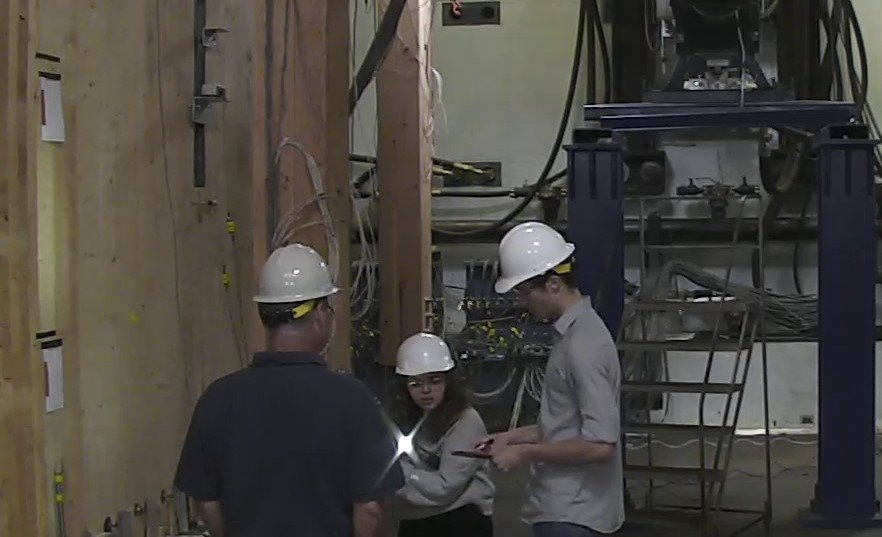
Inspection during large-scale testing with Anthony Clay, an REU student (I was his research mentor) and Prof. Ricles
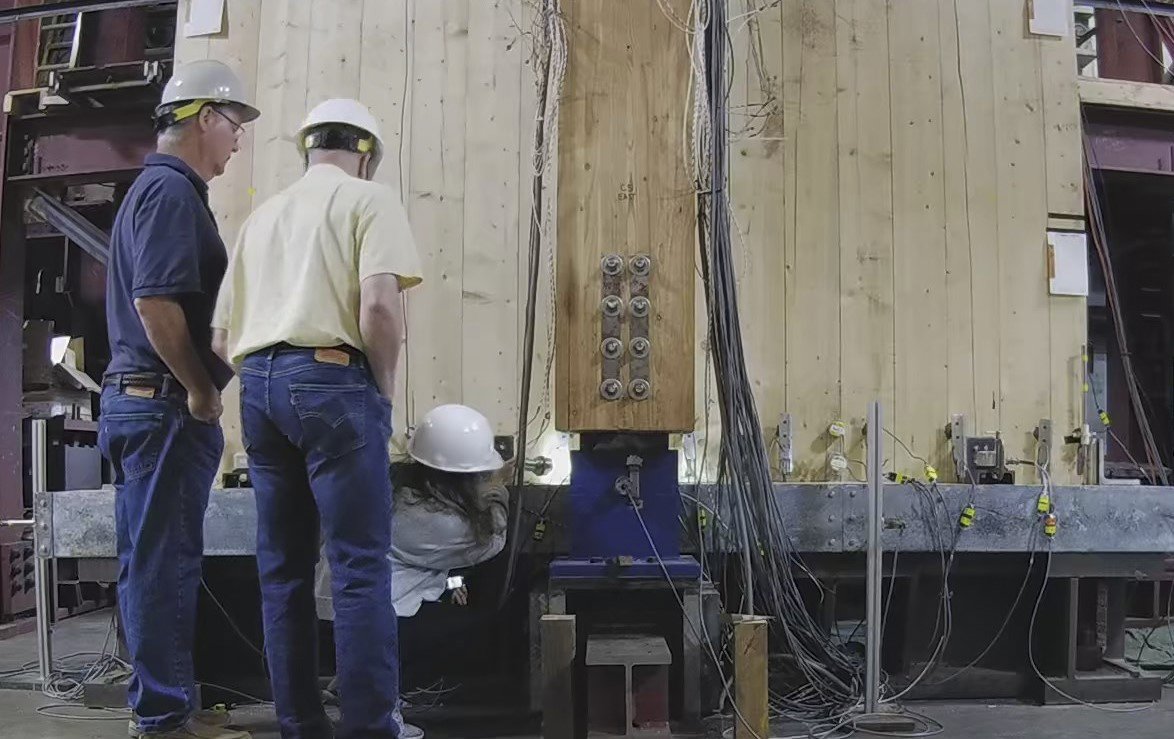
Inspection during large-scale testing with Prof. Sause and Prof. Ricles
NHERI stories: Diverse paths to engineering
The roads to engineering are many. In this series, NHERI researchers share their personal and professional stories – including insights, obstacles, and advice for future engineers.





